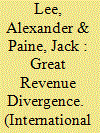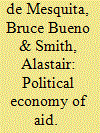| Srl | Item |
| 1 |
ID:
191915


|
|
|
|
|
| Summary/Abstract |
This article describes and explains a previously overlooked empirical pattern in state revenue collection. As late as 1913, central governments in the West collected similar levels of per capita revenue as the rest of the world, despite ruling richer societies and experiencing a long history of fiscal innovation. Western revenue levels permanently diverged only in the following half-century. We identify the twentieth-century great revenue divergence by constructing a new panel data set of central government revenue with broad spatial and temporal coverage. To explain the pattern, we argue that sustainably high levels of revenue extraction require societal demand for an activist state, and a supply of effective bureaucratic institutions. Neither factor in isolation is sufficient. We formalize this insight in a game-theoretic model. The government can choose among low-effort, legibility-intensive, and crony-favoring strategies for raising revenues. Empirically, our theory accounts for low revenue intake in periods of low demand (the nineteenth-century West) or low bureaucratic capacity (twentieth-century former colonies), and for eventual revenue spikes in the West.
|
|
|
|
|
|
|
|
|
|
|
|
|
|
|
|
| 2 |
ID:
090442


|
|
|
|
|
| Publication |
2009.
|
| Summary/Abstract |
We model how the size of a leader's support coalition and government revenues affect trades between policy concessions and aid. We find that aid benefits donor and recipient leaders, while harming the recipient's, but not the donor's, citizenry. The willingness to grant policy concessions for aid depends on how easily leaders can reimburse supporters for their concession. As coalition size increases, incumbents rely more on public goods to reward supporters, making it difficult to compensate for policy concessions. Small-coalition leaders rely more on private goods to retain office, making it easier for them to grant policy concessions for aid. Empirical tests of bilateral aid transfers by Organization for Economic Cooperation and Development (OECD) nations between 1960 and 2001 support the predictions that (1) aid is given by wealthy, large-coalition systems; (2) relatively poor, small-coalition systems are most likely to get aid; but, (3) conditional on receiving aid, the amount increases as the recipient's coalition size, wealth, and policy salience increase. Evidence suggests that OECD members have little humanitarian motivation for aid giving.
|
|
|
|
|
|
|
|
|
|
|
|
|
|
|
|